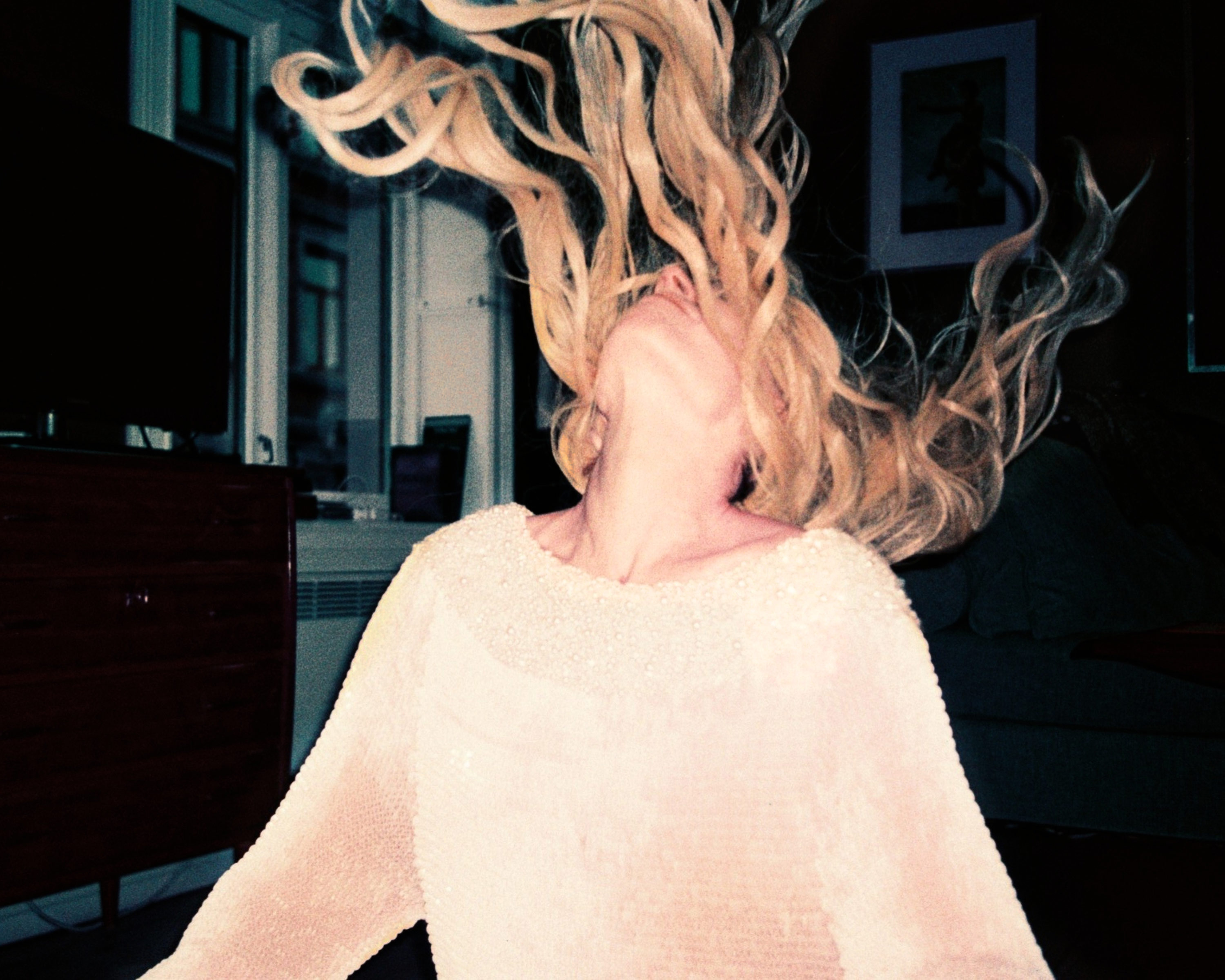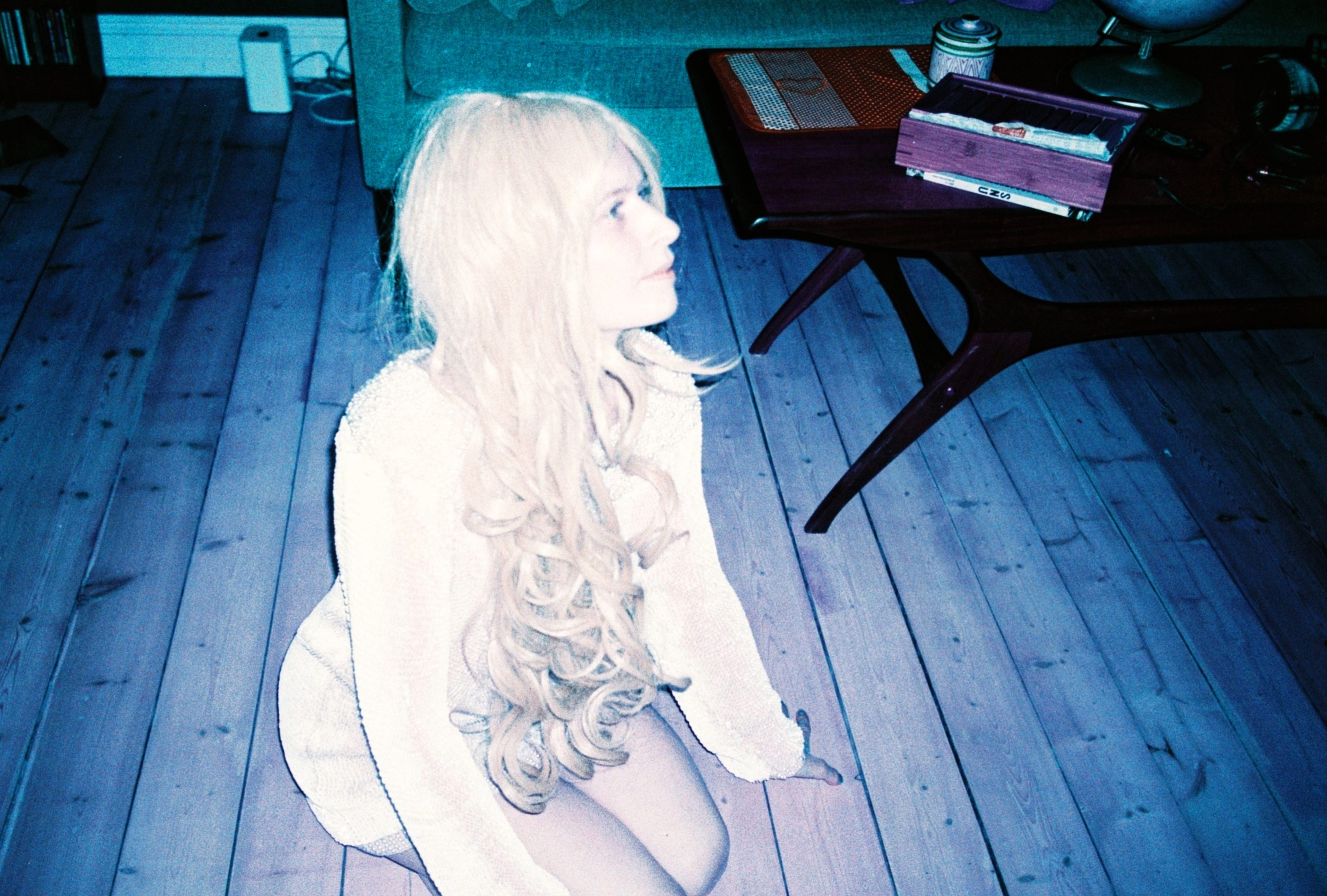
- Interview by Tina Essmaker June 9, 2015
- Photography by Jenny Berger Myhre
Jenny Hval
Jenny Hval is a Norwegian singer, composer, lyricist, and writer. She studied creative writing and performance at the University of Melbourne in Australia before returning to Norway to pursue music. Her debut, To Sing You Apple Trees, was released in 2006 under the moniker, Rockettothesky, and was nominated for a Spellemannprisen (the Norwegian equivalent of the Grammies). It was followed by Medea in 2008, Viscera (2011), and the much celebrated Innocence Is Kinky (2013), the latter two recorded under Hval’s given name. In 2015, she toured in support of St. Vincent and Perfume Genius. Her latest album, Apocalypse, girl, is now out on Sacred Bones.
- songwriter
- musician
Describe your path to what you’re doing now.
I have a complex relationship with art; there’s a certain mystery and solitude to it that I’ve always identified with. It has never been easy, which is why I find it a bit hard to see things as a single path. I only see the obstacles. (laughing) I’m so negative. I guess it’s a Norwegian thing.
Growing up, I spent most of my time listening to music or reading books. Art was liberating, and it was a different form of existence to me. I’m interested in experiencing life differently from the everyday, and creativity is one way to do that. When you create something, you’re making something visceral: you’re actually building a new body for yourself. I spent a lot of my childhood doing that.
When I was younger, I hid my music. I don’t have any formal training, and I had trouble singing. It took me a long time to take music out of my room. I wanted to sing, but I was good at making people think that I couldn’t sing—so I sing badly very well. Those are skills I probably developed because I was so fond of singing that I enjoyed doing what I shouldn’t and exploring my voice in that way. When you’re the odd one, the alien in the class, it’s easy to think, “This is beautiful, but why not do the opposite and see where that takes me?” That was my role: I pushed the limits.
The first time I felt comfortable sharing something I’d done was when I joined a band named Rockettothesky. I needed to do something official, like stand on a stage. It was very difficult for me, and I’m still quite awkward on stage. I love awkwardness, though, because being uncomfortable is part of my path. When I’m on stage, I’m trapped—the song begins and you have to finish. It’s humiliating, but also liberating. It was different when I started recording, because then I could play things for people and run out the door while they listened to it.
Would you describe yourself as an introvert based on what you just mentioned?
Being an introvert is probably too much of a stereotype: there’s more to us than that. Extroverted people perform on stage, too—there are all kinds of people on stage, because it’s about sharing a human experience. But you have to look inside to put something out. Some people might interpret my music as quite personal and internal, but I’m actually trying to create that situation for you as a listener. I’m not so interested in talking about myself; I want you to think about yourself. I want to challenge people in that way, and in order for me to do that, I have to look inward. If I write something that seems private, that doesn’t mean that it is. Artists invent things, and the listener has the freedom to think whatever they want.
What was life like growing up in Norway?
I’m from Oslo, Norway, and lived there until I was nine. Then my family moved south to the countryside, which is the Bible Belt of Norway. (laughing) I wasn’t from a religious family, but I grew up in that culture and witnessed it up close in high school. When I started coming to the United States, I connected with people from the South, even though the Bible Belt of America seems so crazy. In Europe, we only hear the saucy news about America, like some weird new legislature regarding abortion. When I came to the US, I felt connected to people who had grown up in the American South and had stepped out of religion.
Do you think that moving from Oslo to Southern Norway influenced your music or perspective of the world?
I used to think it didn’t. From an early age, I knew I wanted to get as far away from that place as possible. I lived there until I was 19 and hated it, but now I think it has influenced me a lot, and people can hear that influence in my new album. When I was younger, I sang in a gospel choir, and it made more of an impression on me than I hoped it would. I only sang in it for six months before I realized that you can’t do it without being a Christian.
“I’m interested in experiencing life differently from the everyday, and creativity is one way to do that. When you create something, you’re making something visceral: you’re actually building a new body for yourself.”
Did you go to college after high school?
Yes, I went to college at the University of Melbourne in Australia for media studies, but I ended up switching to creative arts. It involved writing, theater, philosophy, and film studies—I did a little bit of everything. I went there for four years.
Why Australia?
I wanted to go somewhere with culture and history. I was very pretentious. I probably would have loved to go somewhere like Oxford, Cambridge, or Yale, but I couldn’t afford those and I didn’t dare try. At that time, it was quite cheap to go to school in Australia: it’s free to attend college in Norway. If you want to study something they don’t offer in the country, you can get government funding to study elsewhere, so that’s what I did. It’s not necessarily free—you acquire a huge student loan—but at least you can go and study wherever you want.
It was an amazing time. I was recording, playing in bands, writing music for theater productions, recording actors’ voices, and doing all kinds of things. I studied performance art and areas I found to be quite academic, and I continually searched for things I considered to be high-brow. When I did music, though, I often did simple pop songs. I eventually started to bring the art and complex philosophy I had been studying into my music.
What did you do after college?
I returned to Oslo. I held some day jobs and studied literature for a while, but I moved back with the intention of pursuing music full-time.
Nobody wanted to work with me, except a one-woman Oslo-based powerhouse label called Trust Me Records. The owner, Marit Karlsen, did a really good job, and I was able to get my music on the radio. In 2006, I recorded an album under the name Rockettothesky called To Sing You Apple Trees, and it actually did pretty well in Norway. It was a rather poppy record, but I wasn’t pop enough to be interesting for long in the pop world. Afterwards, I started playing more internationally.
Since then, I’ve expanded my work and played in more places. I’ve written two books, recorded albums, and worked on collaborations. For instance, I’ve started doing performances during my shows. Right now, I’m traveling with a woman named Zia Anger, who is a brilliant, extremely talented filmmaker and performer. I’ve always wanted to be more of a performer, and I’m definitely not a director, so having somebody there who can imagine the visual part of a show is interesting.

“Being an artist is a risk in and of itself. Over the last few years, I haven’t worked any other job. That is a huge risk, because I don’t have a normal life. Part of that means forsaking comfort and security—if you’re going to do that, you need to make sure you have the drive for it.”
Has there been a point when you’ve taken a big risk to move forward?
I’m taking a big risk by doing what I’m doing right now. Being an artist is a risk in and of itself. Over the last few years, I haven’t worked any other job. That is a huge risk, because I don’t have a normal life. Part of that means forsaking comfort and security—if you’re going to do that, you need to make sure you have the drive for it. I can’t speak for other people, but taking risks with my art is something I must do.
The risk I took for my new album, Apocalypse, girl, was choosing to work with somebody who had never produced an album before. I chose my producer, Lasse Marhaug, based on a conversation he and I had about film. Our conversation was so interesting that I thought it would be a great way to produce an album. He’s also a noise artist, so I’ve had an interesting few months with him.
Do you feel a responsibility to contribute to something bigger than yourself?
I have a lot of respect for listeners. Not just my listeners, but listeners in general—even listeners who hate what I do. I respect them, because whatever contribution I make with my music becomes their contribution to the world. For example, I come from everything I’ve read. My favorite piece of furniture is my bookshelf—besides my family, it is the thing in my life that gives me the most hope. I have the feeling that I come from everything I’ve seen, read, and taken in, including a lot of things I don’t like.
Even the things we don’t like shape us—in some ways, more than the things we do like.
Absolutely. We need to have that resistance. That is how my work should be seen as well. If I contribute to something larger than myself, it’s because people listen to it. It’s up to the listener to decide whether or not I can influence them. It’s good to not underestimate people. I can say that because I don’t really think about marketing when I write. I don’t think my listeners are a buying crowd: they’re a crowd that shares and takes things in.
Are you creatively satisfied?
I don’t think I would make anything if I was.
Where does the drive to make come from for you?
Sometimes I write without knowing where it comes from, and that’s what I’m after. I don’t have thoughts like, “Ah, I must express this.” I just write until something comes out, something that doesn’t seem to come from me. If I write something I didn’t know I could say or wouldn’t let myself say—or that is too embarrassing to say–then maybe other people are feeling it, too. Maybe it needs to be expressed. Expressing something I don’t know the origin of is important to me, as it is to many artists. Art is finding what isn’t just there to grab.
What advice would you give to a young person starting out?
If the young person in question is American, I feel like I’m the wrong person to ask. I wouldn’t be able to give practical advice because I come from a different culture. Americans take so many risks that Norwegians don’t.
How so?
Americans take a risk just by being born. You don’t have the support system we have in Norway—we have a functioning healthcare system and a different social structure.
I can give creative advice, though. I would have given this advice to myself when I was younger and more afraid: “You can do anything on stage—even if it’s small—and it can be really interesting.” When I was doing theater and performance, I learned that even standing on a stage, looking very neutral, can be interesting. Making the slowest, smallest movements is already a performance. I wish I had realized that that is also true with music. A stage is a stage. You can do anything. I’m not talking about the American dream of, “You can do anything,” because that’s a lie—that has everything to do with class and money. But you can do anything on stage.
You’re currently living in Norway, but traveling for shows. How does being home versus touring influence your creativity?
Those two existences are different. The only thing I can do on tour is perform; everything else is done when I’m home. Sometimes I come back from traveling feeling kind of disappointed because I didn’t write. When I travel, I’m in the moment and more open to external influences, but I’m still the kind of person who doesn’t drink and who goes to bed early.
Is it important for you to be part of a creative community?
Absolutely. If I’m home for long enough, I’ll become involved in politics. For the last few years, Norway has been becoming quite conservative, and it’s sad. I read and try to follow politics because it gives me a different kind of courage. It’s the same courage I get from reading poetry or experiencing art: there is another way of existing outside of the safety that you know already. Making my life about conserving what I have by trying to make more money or not lose anything is not a good way to build an ideology. I don’t want to feel too safe. I’m interested in the societal mechanisms that make us unsafe and why they’re made that way. For instance, capitalism is makes people feel insecure and want safety. Have you seen Todd Haynes’ film, Safe?
No, I haven’t. What is it about?
It was made in 1995. It stars Julianne Moore as a wealthy Hollywood homemaker in the late 1980s. Her character starts experiencing strange medical symptoms that make it appear as though she’s allergic to modern life. She reacts to everything, from cars to bug spray—all of these mundane, normal things become terrifying, alien objects that make her sick. Eventually, she ends up in a retreat out in the desert with people who are experiencing similar symptoms. The film isn’t about disease; it’s about fear. I find it to be a crucial subject for our time. That film was a big influence on my album.
What does a typical day look like for you?
It’s impossible to say. I come from a family of people with regular, routine jobs that they love, so I love routine, too. For me, a perfect day is getting up very early and reading. I love doing the same thing every day, but after a while of being on tour, something is freed up. It takes me a long time for me to say, “Okay, I’m going to sleep until 9am, guys!” It also takes me a long time to get used to new time zones. Some people can just shift like that, (snaps fingers) but I can’t.
What kind of legacy do you hope to leave?
I used to think about this more than I should, but now I don’t think about it anymore, and it’s great. I don’t think people should think about it. It’s depressing: it’s thinking about not wanting to die, isn’t it?
A personal legacy is important, but I don’t think of that as a legacy. I prefer to think of my legacy as where I come from, which is from everybody I’ve known and loved, and all of the books I’ve read. My legacy is already part of something bigger in that sense.
“Some people might interpret my music as quite personal and internal, but I’m actually trying to create that situation for you as a listener. I’m not so interested in talking about myself; I want you to think about yourself.”
